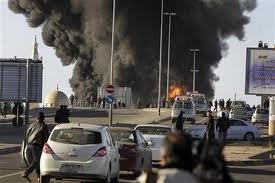NATO refuses to rule out military action in Uganda
By George Murumba
31st Oct 2011:
Buoyed by the devastating success of its jet fighter attacks on the late Libyan leader Col. Muammar Gaddafi’s forces, the North Atlantic Treaty Organisation [NATO] has, upon prompting, refused to rule out a similar military intervention in Uganda or any other part of the world if the need to protect civilians from state brutality arises.
Reliable sources in London have told Uganda Correspondent that the earth-shaking revelation [in the Ugandan context] was made at a closed ‘Post Gaddafi’ foreign policy debate by a top European diplomat who is closely associated with NATO and previously served as his country’s Ambassador in a north African country as well as at the African Union. Our source said that during the Q&A session, a Ugandan who was in attendance shot to his feet and put the diplomat to task.
“…Right from the start, NATO referred to the anti-Gaddafi fighters as “pro-democracy fighters”, not “terrorists”, a term previously used by the UN to describe any group that took up arms against an established government. If Ugandans, who according to the EU and Commonwealth Observers have been through three rigged elections rose up against Museveni’s government, will NATO also call them “pro-democracy fighters?”, the Ugandan asked.
Suddenly, Uganda Correspondent understands, everyone in the room broke into a prolonged fit of laughter. After composing himself, and collecting his thoughts however, the European diplomat is said to have responded and said, “…I leant two things very early in my diplomatic career. (1) Not to predict the future, and (2), not to answer a question that is premised around the word “if”.
The European diplomat’s typical diplomatic speak, or evasiveness to some, is however quickly betrayed by a statement published on NATO’s official website [see: NATO after Libya] in which the organisation’s Secretary General Anders Fogh Rasmussen, writing in the Austere Times, gives his assessment of NATO’s post-Libya role and says:
“…The mission in Libya has revealed three important truths about military intervention today. First, to those who claimed that Afghanistan was to be NATO’s last out-of-area mission, it has shown that unpredictability is the very essence of security.
Second, it has proved that in addition to frontline capabilities, such as fighter-bombers and warships, so-called enablers, such as surveillance and refueling aircraft, as well as drones, are critical parts of any modern operation.
And third, it has revealed that NATO allies do not lack military capabilities. Any shortfalls have been primarily due to political, rather than military, constraints. In other words, Libya is a reminder of how important it is for NATO to be ready, capable, and willing to act”. On 27th October, the NATO Secretary General also said the Libya campaign was “…one of the most successful in NATO’s history”.
Commenting on NATO’s statement on a strict condition of anonymity for fear of being charged with treason in the current political climate, a former Ugandan diplomat, who is now retired and closely associated with the current struggle for democracy in Uganda, said he believes NATO will intervene militarily “to protect civilians” in Uganda if Ugandans were prepared to die for democracy.
“…I have to be very careful with what I say to avoid being charged with treason in the current environment. But as far as I am concerned, the diplomatic answers to the two questions said everything and nothing that I wanted to hear. After failing to cause regime change in Zimbabwe in 2008, NATO decided to use Libya to test the African resolve. I think they have got the answer and will intervene to protect civilians in Uganda if there was a group prepared to die to draw world attention in a sustained fight”, the former diplomat said.
Clearly, the definitive answer on whether or not NATO will intervene militarily in Uganda to “protect civilians” like it did in Libya will depend on the courage of aggrieved Ugandans to rise up like their Libyan counterparts in defence of their constitutional and or fundamental rights and freedoms.
Since the conclusion of the controversial February 2011 general elections that saw President Museveni return to power, several Ugandan protesters, including a two year old, have been shot dead by security operatives. END. Please login to www.ugandacorrespondent.com every Monday to read our top stories and anytime mid-week for our news updates.
![]()


